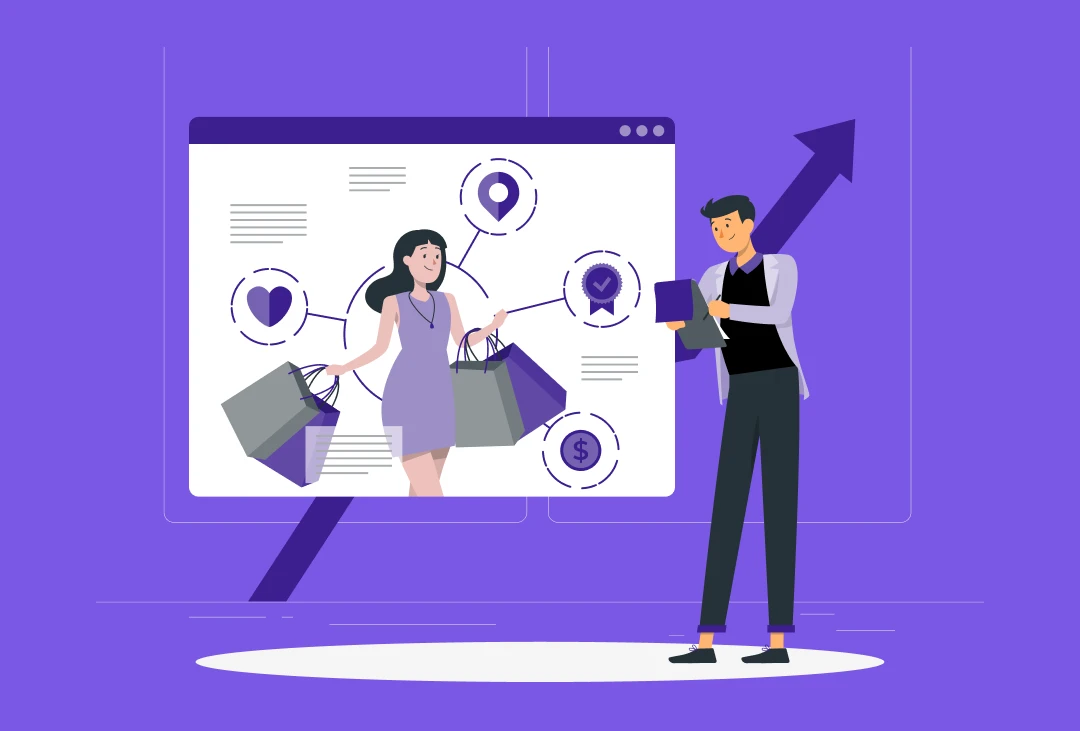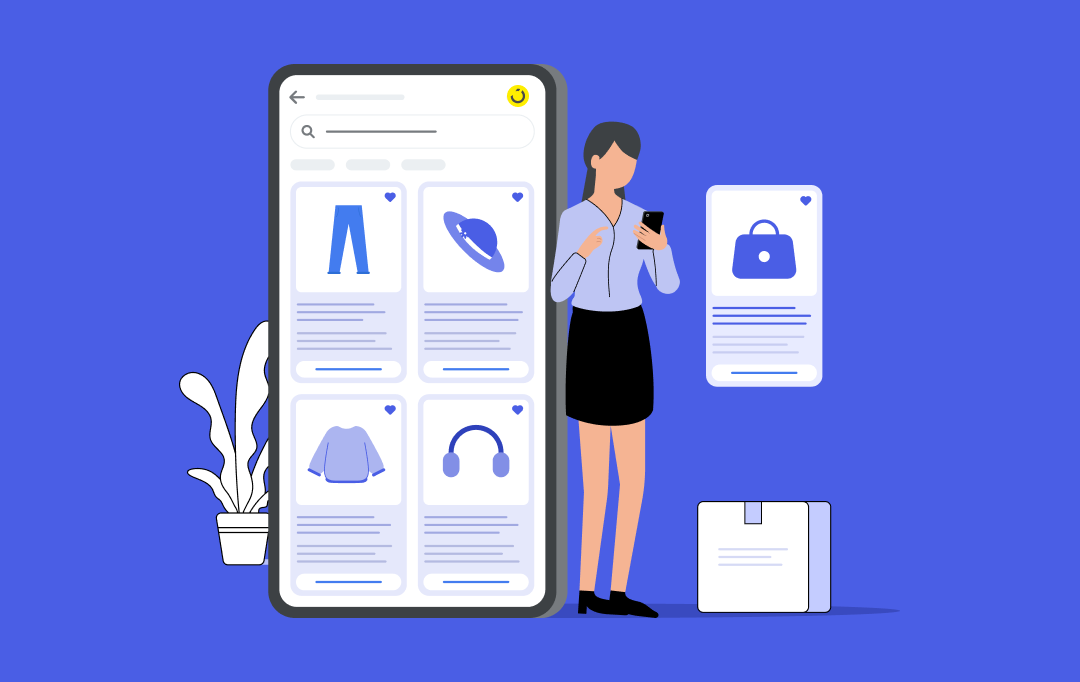- What is PWA ECommerce?
- Why PWA's Work for Ecommerce?
- What Features Make PWA E-commerce More in Demand?
- How Can a PWA Improve the Ecommerce Shopping Experience?
- Enhanced user engagement
- Increased User Adoption Through PWA shortcut on Home Screen
- Superior Instantaneous Performance
- Improved SEO
- Increased Conversion Rates
- Lowered Development Expenses
- Robust Security
- Does Not Occupy Memory in Device
- Few Ecommerce Companies That Have Tasted Success with PWAs
- Alibaba
- Rakuten 24
- Blibli
- How can Appinventiv Help You with Progressive Web App Development?
- FAQs
E-commerce has grown exponentially with the introduction of Progressive Web Apps (PWAs). These powerful apps deliver an app-like experience across the desktop and mobile web to increase online engagement and conversions. Businesses around the world have experienced significant success by implementing PWA eCommerce, such as Starbucks, which saw a 2x increase in daily active users, and George.com(UK clothing site) which observed a 31% improvement in conversion rate.
Throughout this journey, George.com(e-commerce site) has identified remarkable improvements like improved page load time (up to 3.8x faster), lower bounce rate (2x decrease), more page views per visit (20% rise), and longer time on site (28% increase). These statistics indicate the positive transformation that PWAs have brought to the eCommerce market.
PWA eCommerce offers businesses a compelling combination: the complete venture of native apps with internet reach and simplified access. It’s an investment with high rewards, as it quickly improves user experience and boosts conversion rates — all with low, upfront costs. Any company owner should consider PWA eCommerce for maximum impact on their bottom line.
What is PWA ECommerce?
Progressive Web Apps, or PWAs for short, are web-based applications that offer an optimized user experience across desktop and mobile devices. With PWA eCommerce, customers can access information from your site regardless of device type and location; they offer the best segments of native mobile applications with the accessibility and reachability of a website page. Designed to improve performance, it is ideal to build eCommerce PWA for any business looking to provide a speedy, trustworthy, and pleasing customer experience.
As a retailer, Progressive Web Applications offer an ‘app-like’ experience with the best attributes of mobile websites and native apps. Locally-installed ‘native’ apps are the highest-converting channel for commerce, but introducing a PWA eCommerce can give you significant mobile sales growth. Google introduced this technology in 2015 to help retailers drive traffic with SEO and have app features. For ecommerce, PWAs integrate the high-conversion aspects of native applications while maintaining websites beneath the surface. If you’re looking for ways to boost your mobile sales, adding PWAs is a great option.
Why PWA’s Work for Ecommerce?
With more than 50% of web traffic now coming from mobile devices, optimizing the mobile shopping experience is key. Unfortunately, this often leads to e-commerce teams facing a sizable gap between their mobile visitors and those who convert. This ‘m-commerce gap’ must be addressed to make sales online. A website might be optimized for a mobile device, with images and layouts adjusted accordingly – but it’s unlikely that the type of advanced features users expect will be available. This affects customers’ willingness to follow through with a purchase, involving improving the mobile shopping experience itself being essential in closing the m-commerce gap.
Responsive web design may do an adequate job of adjusting to mobile screens, but it can clutter a page with content that only applies to on-the-go users and is often presented in distorted ways. As a result, trying to make purchases over such sites can take time and effort. Furthermore, since many advanced e-commerce features are absent (such as autofill and saved address and payment info), mobile users often need help with attempting to type text via one hand while holding a credit card in the other.
Ultimately, apps offer superior experiences than responsive websites–not to mention the fact that they are more accessible for usage anytime without having to leave web browsers behind. Despite limited starting capabilities, advanced web applications have emerged as the premier e-commerce choice.
What Features Make PWA E-commerce More in Demand?
The main advantages of Progressive Web App eCommerce that businesses should be aware of are:
- Easy to add a homepage – With the help of this one of the outstanding features of eCommerce PWA, your customers can effortlessly add your website or app’s user interface (UI) to their device’s home screen.
- Offline Mode – If your consumers ever lose access to their internet connection, they’ll still be able to explore and purchase from your site even without a web connection.
- Swift loading speed – Your customer experience will never suffer due to slow loading times or network disruptions—your PWA eCommerce is prepared for any situation!
- Push notifications – Push notifications is one of the best features of eCommerce PWA. It allows you to get in touch with customers easily by sending personal messages about new items, sales, and other info through push notifications straight from your store to theirs.
How Can a PWA Improve the Ecommerce Shopping Experience?

PWA for eCommerce business should be strongly considered for any new or existing online store. Many businesses still need to take advantage of this creative technology, which gives you a wonderful opportunity to stand out from your contender and offer customers an unbeatable shopping experience.
Statistics from Similar Web show that phone traffic currently accounts for 65% and desktop 32.92%; however, the mobile conversion rate in the US falls short at 2% compared to 3% on desktop and tablet.

A big gap in consumer satisfaction needs to be filled— and PWA for ecommerce business holds the key to quickly improving your website’s user experience.
Enhanced user engagement
Push Notifications are especially useful for PWA eCommerce because they can cut through the noise of modern life, effectively grabbing customers’ attention where they already are: on users’ mobile phones. Compared to traditional marketing methods like emails, push notifications don’t require customers to have contact information or accounts with you, meaning that you can reach your customers directly and quickly.
Research by PushPro suggests that 96% of users search anonymously on the web, so push notifications are a great way to connect with them. Companies benefit from this technology since it offers an invaluable opportunity to engage with anonymous visitors and convert them into paying customers.
Increased User Adoption Through PWA shortcut on Home Screen
Progressive Web Apps offer a combination of website and native application features, giving users an enjoyable experience. Studies show that Flipkart consumers who removed their application often re-download the PWA with a 60% success rate. Additionally, push notifications for PWAs are opened three times more than email notifications when obtaining user consent. This adds to an improved promotional strategy for any business selling its services and products online.
It is no surprise that positive responses are more frequent when it comes to the use of PWA eCommerce. Consumers don’t need to download anything from an app store or accept a prompt, and the website is installed on their home screen. Such websites now feel like “real” apps rather than just browser shortcuts.
As if it wasn’t enough already, PWAs require no additional upgrades and are simple to install — they quickly download to the home screen, which means users are sure to have access to the most current information all the time. Many business owners can attest that customers readily use their progressive web apps even after declining to download native applications.
Superior Instantaneous Performance
Modern users have often expressed their desire for faster online mobile experiences. A recent study revealed that after 3 seconds of page loading time, almost 53% of visitors leave a web page, and conversion rates decrease by almost 21.8 % per second.
Adopting Progressive Web Apps offers the quickest user experience, as these can usually load in under one second because of the advantage of web speeds and client side caching. They also consume much slighter disk slots, leading to faster loading duration, decreased data use and fewer storage needs, making them an attractive proposition for any business to invest in.
Improved SEO
Progressive Web Apps offer several advantages over native and regular websites. Because they are web-specific and every published content is regularly indexed by search engines, Bing and Google can link any content together for ranking on the web. Meanwhile, the native applications are usually not indexed on search engines. PWAs deliver swift loading speed, decreased bounce rates, fewer data utilization, and positively interactive experiences – all factors that will help your SEO rankings.
Organizations must consider optimizing the PWA for ecommerce business so that it’s properly discovered, crawled, and indexed by search engines, as JavaScript sites may be more difficult for robots to understand.
Increased Conversion Rates
User experiences have a direct impact on online store conversion rates. Eliminating conflict and disappointment leads to more engaged customers who can quickly complete their objectives.
Modern progressive web apps for ecommerce offer a remarkable chance to deliver an improved user experience tailored directly to your customers’ needs. This is a prime opportunity to maximize the benefits of progressive web apps to ecommerce now rather than concerning technical advancements in the future—PWAs enable you to tap into an incredibly powerful way of delivering better customer experiences today.
Lowered Development Expenses
A Progressive Web App for eCommerce can provide a truly unified omnichannel experience. Instead of managing, marketing, and developing their separate designs—a dynamic website, Android applications, iOS apps, and Windows 10 application, PWAs allow businesses to unify all channels under one single platform that is accessible and feature-rich across devices.
This greatly reduces product price and launching time while allowing users to enjoy a quicker, thinner, smoother experience without needing large storage space on their devices. PWAs provide quick page loading and full-screen browsing from their home screen with the bonus of inviting push notifications when desired. This contributes to a great user experience so that customers will return repeatedly.
Robust Security
Another important benefit of PWAs for e-commerce businesses is enhanced security. PWAs employ the HTTPS protocol, which guarantees that all user and server communications are secure and encrypted. As a result, hackers will find it more challenging to intercept and steal sensitive user data, like payment information.
Furthermore, because PWAs do not need to rely on third-party app stores for distribution, they are less susceptible to security concerns than conventional native apps. PWAs improve the overall security of the e-commerce infrastructure and reduce the possibility of downloading malicious software.
For instance, an e-commerce company employing a PWA can guarantee that the payment information of their consumers is always secure by using the HTTPS protocol. In addition to safeguarding sensitive client data, by creating an e-commerce progressive web app, the company will also gain consumer confidence.
Does Not Occupy Memory in Device
Customers don’t need to download and install separate software to use PWAs. This feature makes customer onboarding easy, a trait to which Appinventiv paid special attention while developing a solution for IKEA. This frees up memory on their smartphones and is one of the major advantages of PWAs for e-commerce enterprises. Consider a consumer who routinely makes purchases from an online retailer with a native app. In such a situation, the customer might eventually run out of room on the device, which would prompt the user to delete the app in order to free up space.
As the app is accessed through a web browser, there is no need to be concerned about running out of storage space with PWAs. Additionally, this eliminates the need for companies to design and maintain distinct apps for several operating systems, cutting down on complexity and development costs. With PWAs, customers may access the purchasing experience from any device without having to download or install anything.
Few Ecommerce Companies That Have Tasted Success with PWAs
Several top brands have recently shifted to Progressive Web Apps for their websites, with great success. Companies from all industries are experiencing growth after transitioning, including popular eCommerce marketplaces, social media platforms, online booking services, local listing sites, and more. It’s a game-changer for many businesses looking to stay competitive in an ever-evolving digital landscape. Here are the few best PWA Ecommerce examples for businesses motivation.

Alibaba
One of the biggest e-commerce platforms in the world, Alibaba, adopted a PWA in 2016 and experienced great success. The number of conversions across all browsers increased by 76% for the business.
The company’s PWA is made to be quick, dependable, and simple to use, giving its clients a smooth online buying experience.
The success of Alibaba’s PWA is largely due to its ability to run across all platforms and devices, including those with slower connections and less capable hardware. Customers can locate what they’re looking for and finish their transactions quickly with the PWA’s highly optimized and simplified experience. This is the primary reason why the company adopted PWA for its e-commerce business.
Alibaba’s PWA has also made it possible for the business to reach a larger audience, especially in developing nations with low levels of internet penetration. Alibaba has been able to establish itself in markets where internet access is restricted thanks to the PWA’s capacity to function offline and withstand sporadic connectivity.
Rakuten 24
The well-known Japanese e-commerce behemoth Rakuten 24 is one of the many e-commerce businesses that have experienced PWA success. The company’s decision to adopt PWA has resulted in more user engagement and retention. Over the course of a month, the PWA built by the company allowed Rakuten 24 to increase visitor retention rates by 450% compared to the company’s prior mobile web flow.
Users were able to effortlessly browse across the various sections of the website thanks to the PWA, which allowed the company to provide a quick and smooth user experience. The offline mode, which allowed customers to explore products even without an internet connection, was another benefit Rakuten 24 was able to provide to its customers.
Blibli
One of the biggest e-commerce platforms in Indonesia, Blibli, implemented PWA for its e-commerce business in 2019 and saw explosive growth. In comparison to their previous mobile website, the company recorded a 10x increase in income per user through their PWA e-commerce solution.
This can be credited to their PWA’s smooth user experience, which allowed customers to browse and buy things even when their internet connection was unreliable. Additionally, because customers didn’t need to download an app to access Blibli’s platform, they were able to grow their customer base thanks to their PWA. With the help of these advantages, Blibli was able to establish itself as a prominent player in the Indonesian e-commerce market and dramatically boost its income.
How can Appinventiv Help You with Progressive Web App Development?
Ecommerce businesses can reach new heights using Progressive Web Applications (PWA). The advantages of utilizing a PWA for ecommerce business include heightened engagement, augmented conversion rates, improved customer loyalty, faster loading times, offline access, push notifications, and app-like user interaction. These benefits of progressive web app for ecommerce have real bottom-line implications for businesses incorporating PWA’s into their operations.
Business owners looking to develop a PWA should turn to Appinventiv – the leading Progressive Web App Development Company. We specialize in PWA technology and expert Mobile and Web App development. We provide comprehensive feature-filled solutions with powerful performance while delivering meaningful user experiences. Our first-class developers make sure of this by combining their technical expertise with the latest PWA tools and ecommerce mobile application development.
To quote an example, using the latest development techniques and best practices, our team of experts built Hukoomi and redefined the web experience for the Government of Qatar, leading to 2.6 million actively engaging users on the platform.
Contact us today to learn more about how adding PWA ecommerce development can transform your business!
FAQs
Q. Is PWA good for e-commerce?
A. It’s extremely effective to develop a PWA for an ecommerce business. Numerous advantages are offered, including quicker loading time, offline accessibility, seamless device compatibility, higher engagement, greater conversion rates, and better client retention. PWAs are a great option for e-commerce companies aiming to enhance customer experience and increase online sales because of these benefits.
Q. What is the difference between a web app and a progressive web app?
A. A Progressive Web App (PWA) may be used offline and offers features like push notifications and home screen installation, whereas a web app must be used through a browser and requires an internet connection.
Q. How much does it cost to develop a PWA app for e-commerce?
A. The cost of building a PWA app for e-commerce might vary based on the complexity of the app, the features needed, the time required for development, and the developer’s experience. PWA e-commerce development is, however, typically more affordable than creating distinct iOS and Android apps.


- In just 2 mins you will get a response
- Your idea is 100% protected by our Non Disclosure Agreement.

Key takeaways: Outdated systems cause inefficiencies, poor customer experiences, and missed opportunities. Appinventiv helped a US retailer achieve a 25% sales increase and 15% growth in AOV post-transition. Real-time data enhances customer experiences and reduces the cart abandonment rate The new platform handled 3x traffic during peak periods, supporting future growth. Ever noticed how fast…

How Much Does It Cost to Build an E-commerce App Like Noon?
Key takeaways: Noon’s success highlights the rising demand for mobile-first eCommerce in the UAE. Building a similar app can cost anywhere between $ 30,000 and $200,000+, depending on the scope. The blog covers all key user and admin features needed to build a Noon-like app. Identify key cost drivers, including feature complexity, scalability, platform, and…

How to Build a Quick Commerce App? Features, Process, Costs
Key Takeaways Quick commerce is a rapidly growing market driven by consumer demand for ultra-fast delivery and seamless convenience, projected to reach 900 million users by 2029. Quick commerce app development costs vary widely based on features and scale, ranging from $40,000 for an MVP to $400,000+ for a fully featured app. Core features, such…

















